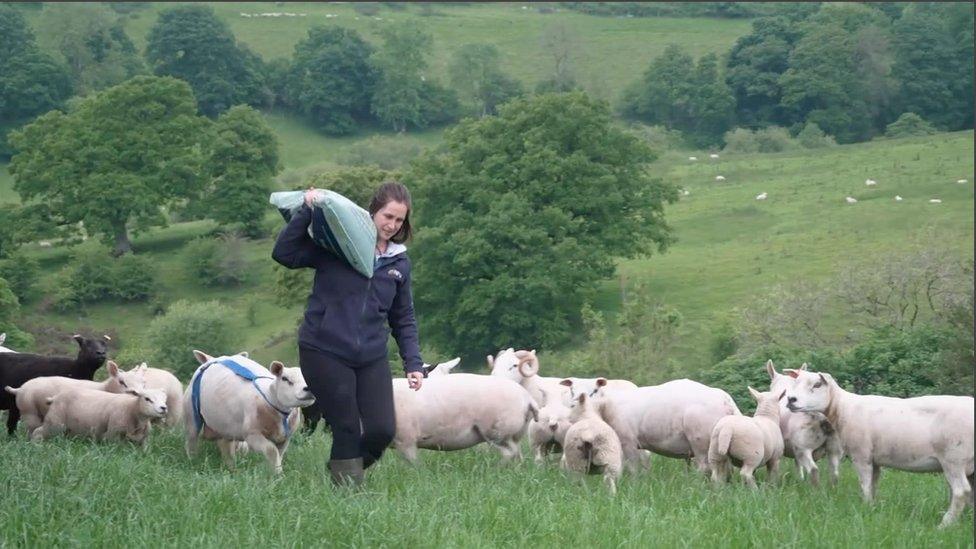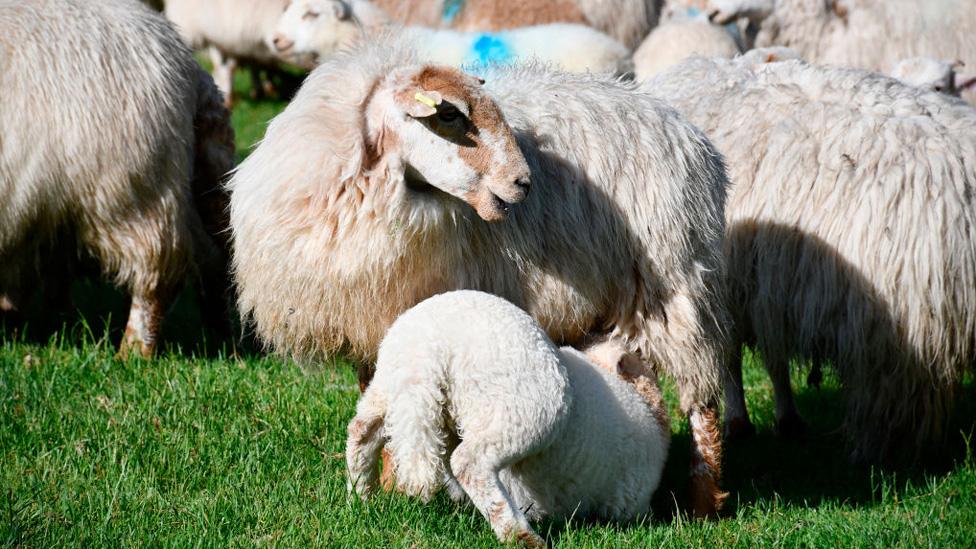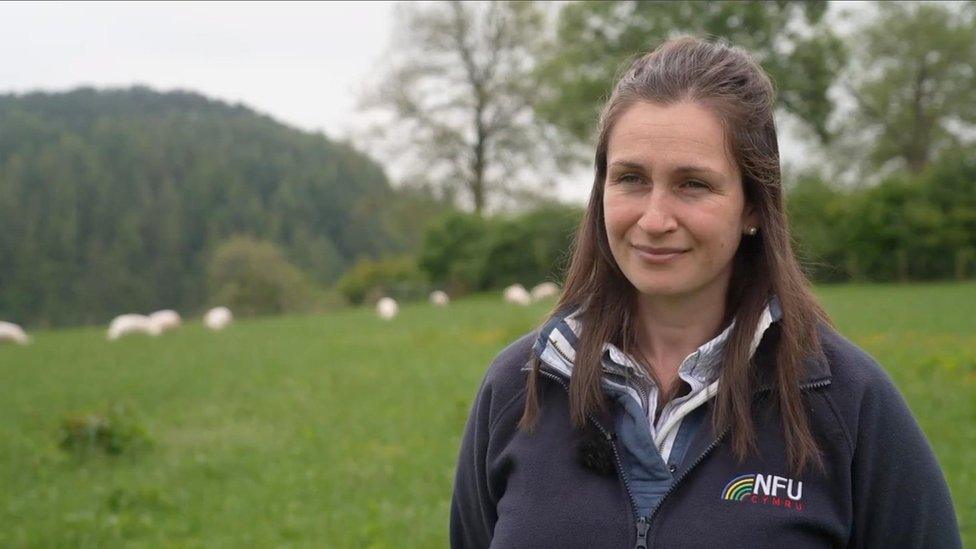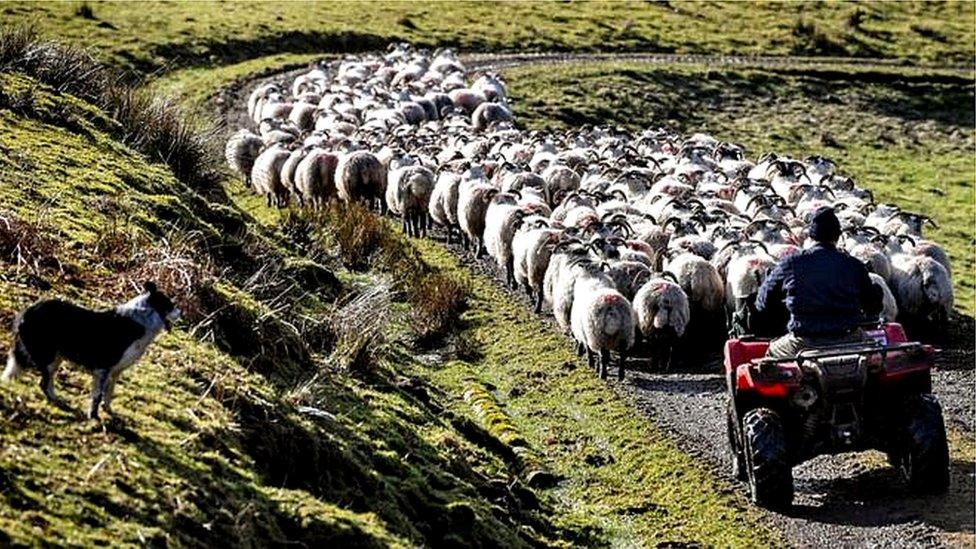Ukraine war should trigger farm subsidies rethink - union
- Published
- comments

New agricultural legislation is set to be announced in September
Disruption to food supplies caused by the pandemic and war in Ukraine should trigger a rethink of major changes to farm subsidies, a union has said.
Ministers plan to offer agricultural funding for environmental work.
But NFU Cymru said it risked "widespread" land use change and farmers needed ongoing "stability payments" to grow food.
The Welsh government said it was in an "ongoing process of engagement" with the industry.
Ministers are due to unveil details of their long-awaited Sustainable Farming Scheme to replace EU-backed farm payments this summer.
A first-of-its-kind Agriculture Bill for Wales is set to follow in September.
NFU Cymru president Aled Jones said 2022 was a "seminal year" for the industry and, from a farming perspective, the new legislation would be "the most important to go through the Senedd in its 23 years of existence".
Instead of offering direct payments to farms based on how much land they have, a new funding model is set to focus on rewarding work to deliver clean air and water quality, mitigate flood risks, fight climate change and boost biodiversity.
Enhancing access to the countryside, protecting natural and historical landscapes as well as improving animal health and welfare will also lead to payouts.

Rules to replace EU subsidies have been discussed for a number of years
It is not yet clear how exactly this will work in practice and how individual farms will fare financially.
But NFU Cymru is making a last-ditch appeal for some sort of direct payment to farms to be retained as part of the new system, as it hosts an event in the Senedd on Tuesday.
Direct payments provided "a key safety net for Welsh farmers" in the past, it said, while the new scheme could lead to "widespread land use change into forestry or… rewilding", resulting in the displacement of people and communities.
Mr Jones said revisions were needed to ensure levels of domestic food production were "assessed, maintained and enhanced" alongside the environmental commitments.
"Welsh agriculture makes an unparalleled contribution to our rural communities, economy, landscape, as well as to our national identity, our language and culture," he said.
"More than ever, in these difficult times, the continued supply of safe, high-quality, affordable food has to be a strategic priority for the nation."

Gwawr Parry said farmers needed certainty in what payments they could expect
Sheep farmer Gwawr Parry from Llanfair Caereinion in Powys said what she needed was "a level of certainty, to understand a bit better what the plans are and what will be available to farms".
"At the moment if we're looking at a five-year plan we wouldn't understand what we could achieve or invest in," she said, adding that the new scheme needed to be simple and open to all active farmers.
Environmental groups have been pleased with the route the Welsh government is taking and do not want the reforms to get any less radical.
Arfon Williams of RSPB Cymru said: "Any short-term gains in food production at the expense of the environment will have a significant impact on food production in the medium and long term.
"This means any form of stability payment for farmers must support them to move towards a more sustainable farming model."
A Welsh government spokeswoman said stability payments for farmers would continue during and beyond this Senedd term as part of a transition to the new system, due to be introduced from spring 2023.
"Future farm support will reward farmers who take action to meet the challenges of the climate and nature emergencies in ways that make the sector more competitive and resilient," she added.
"The sustainable production of food and actions to deliver environmental outcomes are complementary, not competing agendas."
The Conservatives have called for a "food summit" to cope better with the consequences of the war in Ukraine and reduce the risk of shortages.
Welsh Tory rural affairs spokesman Samuel Kurtz said "we need all parts of the supply chain to get together, from producer to retailer, supported by the Welsh government, to develop a plan to ensure our high-quality Welsh produce continues to find its way onto the tables of the people of Wales".

WILD MOUNTAINS OF SNOWDONIA: Five farming families open their gates and share their lives
BROTHERS IN DANCE: The remarkable duo at the forefront of UK dance

- Published21 September 2021

- Published23 May 2021
